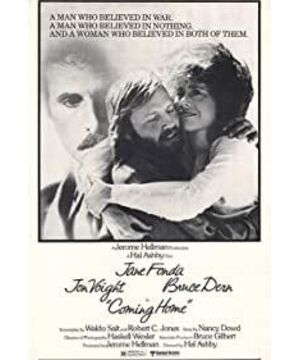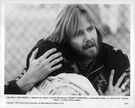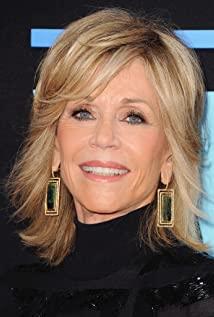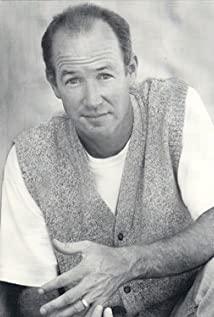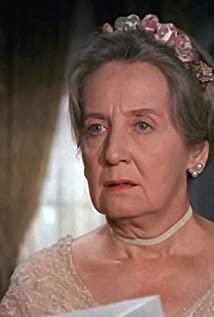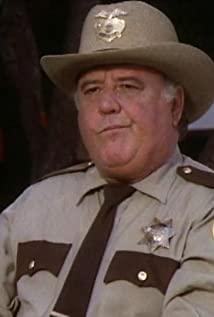Hal Ashby's anti-war manifesto COMING HOME has a opening killer and ending - an improv conversation from real-life paraplegic Vietnam War vets, among whom, Luke Martin (Voight) remains silent, paying due respect to other's authenticated voice; and for the ending , Ashby goes understatedly poetic, juxtaposing three protagonists' respective actions and topping the movie off with a radical sucker-punch, sometimes death can be aligned with such beauty, especially against the nature force which hits like a juggernaut -, which leaves everything in between wobbling between a stern censure of war's atrocity and futility, and a felicitous meet-cute between an able-bodied woman and a disabled man.
Hitting the home run of being nominated for 8 Oscars, including the Big Five and all four acting categories (eventually won 3), COMING HOME is a seminal cinema agitprop that jumps on the bandwagon of Vietnam War's disillusioned sequela, and rams home its lucid message with poignancy, compassion and persuasion, if less artfully, as the plain truth speaks volumes itself.
Jane Fonda plays an ordinary military wife Sally Hyde, when her Captain husband Bob (Dern) is deployed to Vietnam in 1968, she finds vocation in volunteer work at a nearby veterans hospital, where she meets her former high school classmate Luke, now paraplegic and seething with grievance. The two strikes up a friendship that is profuse of romantic tingles, what will it take for Sally to two-time her husband? A cocktail of her compassion (pity sex is something we can all bank on), Luke's winning charm , Bob's prejudice and gung-ho spirit, plus a deep-seated void needs to fulfilled (the earth finally moved thanks to Luke, sans priapic penetration, a revolutionary moment of addressing female orgasm in American cinema), Sally's transmogrification takes shape both physically ( hairdo,an eyesore to today's aesthetics) and mentally (her view of the war alters organically by the horrific aftermath she experiences firsthand in the hospital), albeit at the cost of her morality, which Ashby deems of much less import than the imperative to “stop war and make love", in fact, Sally and Luke's union represents a quintessential American dream which is consummated belatedly, between a school jockey and a cheerleader.
By cramming the movie with a rich soundtrack of iconic hits (The Beatles, The Rolling Stones, Tim Buckley, Bob Dylan, Aretha Franklin, Simon and Garfunkel, you name it!), COMING HOME incubates an unsetting discrepancy with its drab palette and bleak reality (a suicide is witnessed with not enough emergency but apathy), and really has its finger on the pulse of the zeitgeist. Narratively, Ashby doesn't mince words about his true cause, thus subtlety is wanting in expressing the obvious.
For the two Oscar-winning performances, both Fonda and Voight should owe their victory as much to serendipity as their own aptitude, an Oscar No. 2 is quite a feather in Fonda's cup, only Sally is entrenched with a rather uninspiring character arc, her ordinariness is too much in the forefront, although Fonda delivers an all-around effort to extricate Sally from her conservative shell, still, her inscape is sadly, without much complexity to be astonished about (Jessica Lang has done a finer job in Tony Richardson's posthumous BLUE SKY 1994); Voight, apart from his touching peroration near the end, carries off with a hefty tang that we never know where his damage lies, whether he recovers or not, there is a perceivable sadness in his slightly stiff smile, the scar is appalling, keep smiling, man.
The unknown Penelope Milford reaps an Oscar nomination as Sally's gal pal Vi Munson, which she earns with one scene by unleashing Vi's bottled-up devasation at her brother's demise. Last but definitely not the least, a terrific Bruce Dern, though losing out his Oscar to Christopher Walken in THE DEER HUNTER (1978), is actually, mesmerizing in eking out Bob's pent-up disintegration with superlative assurance and explosiveness, which essentially elevates the coda to the stratosphere of its much-needed impressiveness, for what it is worth, Hal Ashby's COMING HOME ultimately rises above its own political agenda and finds humanity in its core, for that reason alone, it deserves a place of its own.
referential entries: Ashby's HAROLD AND MAUDE (1971, 7.4/10), THE LAST DETAIL (1973, 8.1/10), BEING THERE (1979, 8.3/10); Tony Richardson's BLUE SKY (1994, 6.1/10).
View more about Coming Home reviews


